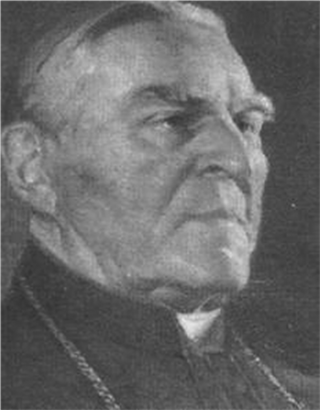Joseph Martin Nathan

Personalia
Born:
Died:
Profession:
Persecution:
Save people with disabilities
Memberships
Curriculum Vitae
Joseph Martin Nathan was born in Stolzmütz/Upper Silesia [Tłustomosty] in 1867, initially attended grammar school in Leobschütz and moved to Ratibor in 1884, where he graduated in 1887. He then began studying theology in the summer semester of 1887 in Freiburg/Brsg. and joined the student fraternity Brisgovia. His studies were initially interrupted by his military service from 1887-1888 as a one-year volunteer in the 1st Silesian Grenadier Regiment No. 10 in Breslau and then continued in Breslau. After his ordination to the priesthood in Breslau in 1891, he worked as a cooperator in Zabschütz [Zawiszyce] near Leobschütz in Moravian Silesia, was then transferred to Branitz [Branice] in 1892, which belonged to the Austrian Archdiocese of Olmütz, and took over the management of the parish in 1899. As he was committed to helping the sick and needy from the outset, he also became the founder and organizer of the "Branice Sanatorium and Nursing Home" for the mentally handicapped in 1897. His plan for a research institute for brain and nervous diseases was later finally crushed by the National Socialists.
In 1914-1918, Joseph Martin Nathan represented constituency 9 Oppeln in the German Reichstag as a member of the Center Party. In 1916, he was appointed Archbishop Commissioner for the Prussian part of the Archdiocese of Olomouc in Silesia and Dean of the Katscher [Ketř] Deanery. In 1924 he was appointed Vicar General for the Branice part and in 1926 he was appointed Apostolic Protonotary.
After the occupation of the Sudetenland by German troops in October 1938, Archbishop Leopold Precan of Olomouc (1923-1947), Metropolitan of Moravia, appointed Joseph Martin Nathan as his Vicar General for the Sudeten German part and thus as his representative to the German Reich government. During Lent 1943, he was able to fulfill the request of several Dachau priests and donate a statue of the Virgin Mary "Our Lady of Dachau" to the camp chapel in Dachau concentration camp.
Prus XII (1939-1958) appointed Joseph Martin Nathan Titular Bishop of Arycunda and Auxiliary Bishop for the German areas of the Archdiocese of Olomouc, based in Branice, on April 17, 1943. He was consecrated bishop by the Bishop of Warmia, the Upper Silesian Maximilian Keller (1880-1947), in the Branitz Institutional Church. During the Nazi era, Joseph Martin Nathan tried to save as many of the patients entrusted to him as possible from euthanasia, "by simply sending them home" and thus saving them. However, he was unable to prevent some of the patients from being deported to the Pirna-Sonnenschein/Saxony killing center. Before the outbreak of the Second World War, he succeeded in placing the Branitz institutions under the control of the Wehrmacht in order to prevent the systematic implementation of euthanasia. In 1941, a military hospital was set up in part of the Branitz sanatorium and nursing home.
For the church department of the Troppau Gestapo, Joseph Martin Nathan was considered a "persona ingratissima". He had to undergo Gestapo interrogations to find incriminating evidence in his sermons, but to no avail. As the Red Army approaches Branitz, the Wehrmacht hospital is evacuated. 1,100 mentally ill patients remained in the Branitz asylum. Because the institution was exposed to bombing raids and shelling, things became critical for the patients. Joseph Martin Nathan is able to agree a ceasefire with the Soviet soldiers for a few hours; during this time, on Good Friday (March 30), he flees on foot 14 km to Freudenthai [Bruntal] with 500 transportable mental patients, where they can all be brought to safety. From here he went to the rectory in Mährisch Schönberg [Sumperg]. Here he summoned all the priests who could still be reached to a deanery conference.
After the war, Joseph Martin Nathan returned to Branitz and attempted to slowly rebuild the destroyed institution buildings. However, the Olomouc deanery of Katscher [Ketf] now fell under Polish administration according to the new post-war order. The Polish Primate Augustyn Cardinal Hlond SDB (1881-1948) declares Auxiliary Bishop Joseph Martin Nathan deposed and places the Branice region under the newly formed Apostolic Administration of Opole. Joseph Martin Nathan had to leave Branitz on December 21, 1946, seriously ill and was expelled to Troppau [Opava]/CSR, where he died in the Marianum there shortly afterwards on February 4, 1947. For political reasons, he was initially buried in Troppau against his wishes, but in 2014 his mortal remains were transferred from the Czech Republic to Branitz, now in Poland.
Citations
Krause, Peter/Reinelt, Herbert/Schmitt, Helmut (2020): Farbe tragen, Farbe bekennen. Katholische Korporierte in Widerstand und Verfolgung. Teil 2. Kuhl, Manfred (ÖVfStG, Wien) S. 226/227.; Photo: ÖVfStg
